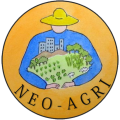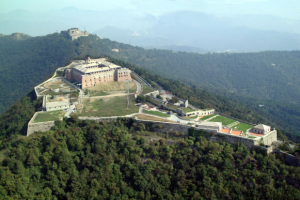A creator, a poet with a lot of common sense.
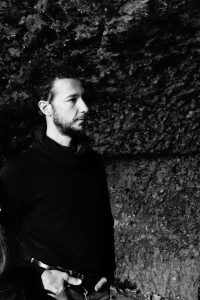 Lino was born 36 years ago in Milan. Born in a family of southern Italy, with peasant origins from his father’s side; he grew up in the city. Lover of creation he turned to graphic design and jewelry. As a teenager he worked with passion different materials; wood, clay, wax and metal. He was then a jeweler for eight years. Arriving to Paris to continue his job, the path to change triggered; “I thought that there were too many things that didn’t go well; with respect to what I was eating, the influence it had on my health, on my way of being, I questioned everything. I could see that what I ate in Paris did not taste the same as the vegetables that came from the garden of my father.” Lino thought that many people had diet problems but they didn’t notice it or couldn’t do otherwise, “It is true that some organic products can be a bit expensive in Paris and that is why we must try to create local initiatives; I started to ask me questions about the impact of agriculture on our lives and I wanted to propose solutions.”
Lino was born 36 years ago in Milan. Born in a family of southern Italy, with peasant origins from his father’s side; he grew up in the city. Lover of creation he turned to graphic design and jewelry. As a teenager he worked with passion different materials; wood, clay, wax and metal. He was then a jeweler for eight years. Arriving to Paris to continue his job, the path to change triggered; “I thought that there were too many things that didn’t go well; with respect to what I was eating, the influence it had on my health, on my way of being, I questioned everything. I could see that what I ate in Paris did not taste the same as the vegetables that came from the garden of my father.” Lino thought that many people had diet problems but they didn’t notice it or couldn’t do otherwise, “It is true that some organic products can be a bit expensive in Paris and that is why we must try to create local initiatives; I started to ask me questions about the impact of agriculture on our lives and I wanted to propose solutions.”
He also challenged his urban life: “In the big cities there are meeting places but not really human spaces. We are always on the concrete; we are exposed to a constant stream of news and information that make us detach ourselves from what makes us feel good. I feel a real sense of wellbeing when I am in the parks, the mountains, the sea, just in nature.” Having always been part of more militant movements linked to social issues, Lino became interested in ecology, the relationship between man and nature and the search for solutions to restore their balance in a Men agglomeration.
It was with great common sense that Lino stepped back from his silversmith work: “My work was very polluting; by the acids that I used but also because of the extraction methods of metals. They involve an exploited workforce and have disastrous consequences for the ecosystem. I was part of this chain and I found that I could not bring solutions so I had to change track.” Always driven by his thirst for beauty creation, sustainable this time, he naturally turned to agriculture. He felt he will find more wellness and balance, he had in mind the dream of a smiling accomplished farmer who, fork in hand, looking at his field with pride.
“Caminante no hay camino, se hace camino al andar…”(“Walker there is no path, path is made by walking” Antonio Machado)
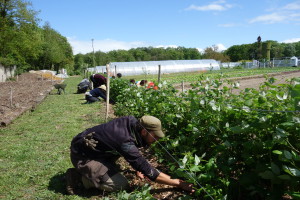 Lino saw himself in the countryside talking about plants and explaining the complexity of ecosystems. But he had to learn, practice, meet the right people to trace his path and navigate it the best. He decided to test if he was able to do physical work outdoors in all seasons; he was a bike messenger for two years in Paris. “I enjoyed it, I like to be outside, to breathe, to observe around me and live the moment. In my jeweler studio I never saw the daylight.”
Lino saw himself in the countryside talking about plants and explaining the complexity of ecosystems. But he had to learn, practice, meet the right people to trace his path and navigate it the best. He decided to test if he was able to do physical work outdoors in all seasons; he was a bike messenger for two years in Paris. “I enjoyed it, I like to be outside, to breathe, to observe around me and live the moment. In my jeweler studio I never saw the daylight.”
He then pursued a BPREA (a professional diploma to become agricultor) in organic vegetable gardening near Paris. He found that the dominant discourse in this formation was very influenced by the political one: intensive production, mechanization, supermarkets, profitability … Lino therefore exposed his thoughts and needs to his teachers who advised him readings and guided him towards producers in accordance with his expectations. “At the beginning of the training there was a conflict in the class between those who supported the model of local agriculture, small scale Agroecology and large farmers with their big tractors. But by talking with different people you realize they have returned to the system by imitation but they are just as passionate as you and they also have families, constraints. I found that rather than create a conflict, we must improve dialogue. I see that things are changing little by little and it makes me want to continue.”
The court of Versailles used to eat peaches from Montreuil (France)
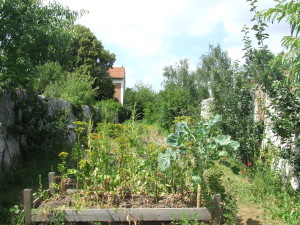 Once his BPREA obtained, Lino had the opportunity to become the head of a garden for the association “Le sens de l’humus” of Montreuil (France). This is an experimental and educational garden, inspired by permaculture which assesses the different methods of existing organic gardening and techniques of soil improvement using various amendments. It is a garden with a hundred fruit trees that belongs to the last horticulturist of Montreuil. Formerly Montreuil gardens produced flowers, vegetables and especially peaches for the court of Versailles, the English Court and the Tsar of Russia. Enclosures or Peaches walls are located between the walls covered with plaster which creates a microclimate favorable to the plantations.
Once his BPREA obtained, Lino had the opportunity to become the head of a garden for the association “Le sens de l’humus” of Montreuil (France). This is an experimental and educational garden, inspired by permaculture which assesses the different methods of existing organic gardening and techniques of soil improvement using various amendments. It is a garden with a hundred fruit trees that belongs to the last horticulturist of Montreuil. Formerly Montreuil gardens produced flowers, vegetables and especially peaches for the court of Versailles, the English Court and the Tsar of Russia. Enclosures or Peaches walls are located between the walls covered with plaster which creates a microclimate favorable to the plantations.
The garden is also a place of welcome and inclusion of marginalized people: “Long-term unemployed, seniors, people with disabilities, young immigrants with language difficulties rebuild their lives through practical activity of gardening, awareness raising activities, friendly and supportive group life.” Lino fights alongside the association to protect these gardens from urbanization and to keep them alive.
Become a farmer to take care of the earth and men, on his way to Italy!
Lino thought he would stay in France to cultivate but he met his companion (Francesca) and decided to return to Italy. They now plan to create a micro-farm in one of the ancient military forts of Genoa.
“We wish, among other things, to show how many people can be fed with a small area and take care of the earth and humans.” Lino is eager to become a farmer, he knows that it is a physical work but also very rewarding, “It is beautiful to see the result of your efforts. I love watching the little animals and observe their interaction with plants and the improvement that I could bring to the place that I worked. Being peasant is the art of cultivating the land and make it more fertile, I like the poetic side of this occupation.”
For him, farming is a key occupation; it is creating the vital food for all of us. He considers it’s essential that citizens respect the farmers who feed them and vice versa. “Take care of me because I take care of you.” It is in this direction that he wants to develop the CSA (Consumers Supported Agriculture) in Italy where this system is very limited; only in a different form and without pre-purchase contract. It is for him a great militant act that allows sharing the risk with the farmer. He will work to promote local social energy and collective intelligence.
Lino is ready to face all the challenges of this great activity of which he perfectly captures the complexity: “These are not simple lines of salads and carrots, there is a whole world around and it’s huge. The farmer has the responsibility to take care of this whole, to share and give, for one and for others.”
His advice for future new-peasants
“Try! If you feel like you’re interested, go look for information, seek an association or a farmer who is willing to share, get your hands dirty, observe then jump in! It’s worth it! “
“Be responsible and generous! “
